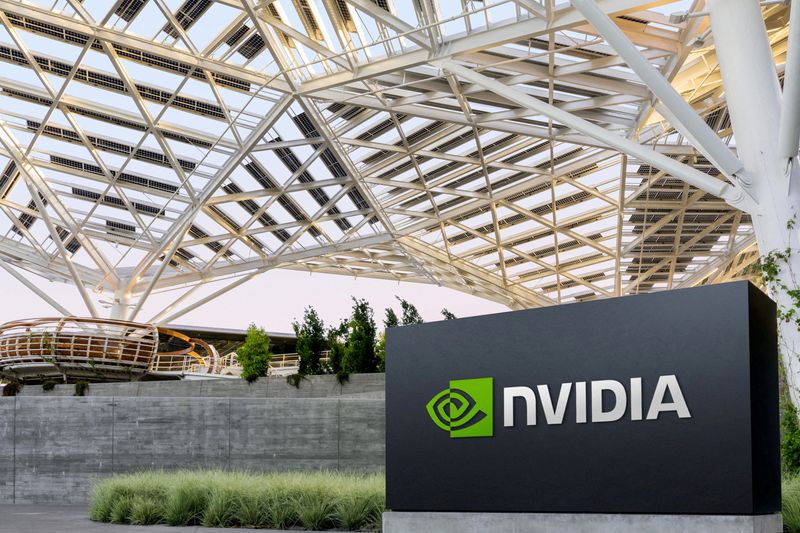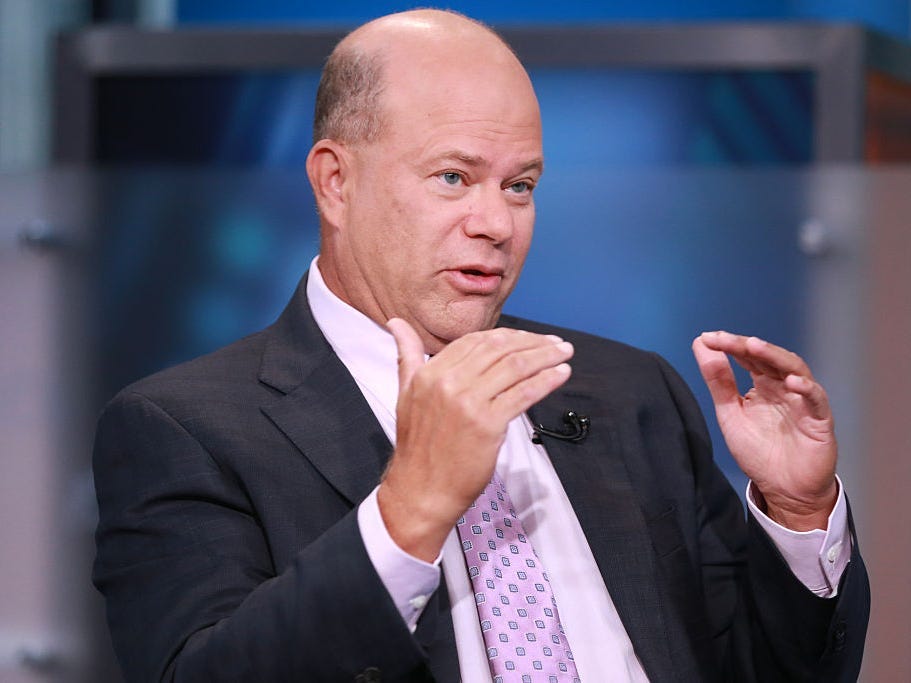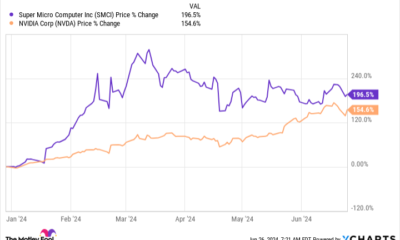Markets
Will the selloff in Nvidia, chip shares prolong?

Thursday marked a difficult day for a lot of the tech sector, notably semiconductors. The favored Philadelphia Semiconductor Index (SOX) dropped 350 foundation factors, with well-owned and favored shares falling 4-6% with none vital occasions.
“No incremental and new unfavourable newsflow or knowledge factors on the elemental aspect of the equation to create a rush for the exits,” analysts at Mizuho commented.
“That’s the good half,” they added.
Mizuho believes that the market skilled a rotation into rate-sensitive winners because the decrease client worth index (CPI) report fueled hypothesis that the Federal Reserve would possibly reduce charges as early as September.
Whereas lively fund managers could not have been in a rush to promote Huge Cap Tech and Semiconductor Winners to spend money on housing, biotech, utilities, actual property, small caps, and REIT shares, quantitative and passive methods had been seemingly taking that motion.
The larger query that now looms, based on analysts at Mizuho, is the impression of the upcoming PPI knowledge launch at 8:30 am ET. If it is available in weaker, it would set off additional rotation out of semiconductors and tech.
Analysts consider that the Thursday sell-off was a “wake-up name”, signaling it is perhaps time to begin taking earnings in main tech and semiconductor AI winners. The previous week noticed vital positive aspects in these shares with none new developments.
“It simply didn’t appear wholesome to me, as valuations simply go greater forward of earnings season to come back 2H July. The large and quick rotation out of Software program and into Semis this week solely made yesterday extra painful,” analysts continued.
The broader sell-off and rotation out of semiconductors yesterday could possibly be a preview of what is to come back when Nvidia (NASDAQ:) finally guides solely “inline” or misses expectations.
“Sure, that day will finally occur. Belief me on that. No clue how quickly and what quarter. Not going in CY24, and even early CY25 for my part,” analysts at Mizuho added.
“However it does occur, and the broad sell-off and rotation OUT OF SEMIS yesterday was a fast sneak preview. Suppose ‘no place to cover’ when an unwind begins. All semis will go decrease.”
The meltdown in semiconductor tools shares, reminiscent of Utilized Supplies (NASDAQ:), KLA Corp (KLAC), and Lam Analysis (NASDAQ:), which dropped 450-600 foundation factors with out bouncing again, exemplified the potential for an eventual semiconductor market unwind.
These shares, closely owned by AI winner baskets and non-tech generalist buyers viewing them as “picks and shovels of AI enlargement,” had been bought off rapidly.
“So when these funds or momentum methods see a possible break-down or rotation, they promote first, ask questions later,” analysts at Mizuho famous.
They speculate that the NVDA and AI semiconductor unwind would possibly happen when main cloud hyperscalers focus on moderating their capex funding progress, reasonably than slicing it. Though they don’t anticipate this occurring via CY25, they warning that if buyers start to fret that 2025 or 2026 calendar years may symbolize a short-term peak, many will seemingly promote earlier than any precise indicators emerge.
Markets
Hedge fund billionaire David Tepper says he's loading up on Chinese language shares after the nation's stimulus bazooka

-
David Tepper is rising much more bullish on Chinese language shares amid the nation’s new fiscal stimulus measures.
-
The brand new measures embrace interest-rate cuts, liquidity assist, and inspiring firm inventory buybacks.
-
Tepper views China’s inventory market as extra enticing than the US inventory market on account of valuation variations.
It is a purchase “the whole lot” second for Chinese language shares after the nation , in line with billionaire investor David Tepper.
In an interview with CNBC on Thursday, Tepper outlined his bull case for China’s inventory market, which has been virtually left for useless in current months because it trades on the identical degree it did in 2007.
“I assumed that what the Fed did final week would result in China easing, and I did not know that they had been going to deliver out the large weapons like they did,” Tepper stated, referring to the Federal Reserve’s
That huge minimize is giving China’s central financial institution some respiratory room in implementing its personal fiscal and financial stimulus insurance policies, in line with Tepper.
In current days, China has minimize key rates of interest, introduced liquidity assist for its inventory market, lowered financial institution reserve necessities, and even inspired firm inventory buybacks.
“Encouraging buybacks of shares. Okay, that is China. That is inventory buybacks. Not solely encouraging it, lending you cash to do it,” Tepper stated.
He added: “I took it that they did quite a bit, they exceeded expectations, and he promised to do an increasing number of and extra, and that is very unusual language, particularly for any central banker, however particularly over there,” referring to from Individuals’s Financial institution of China governor Pan Gongsheng.
Chinese language shares have responded to the stimulus measures with huge strikes larger. On Thursday, shares of large-cap China tech shares like , , and surged greater than 7%.
Even the broader soared 8% on THursday and is up greater than 16% this week alone.
However Tepper believes Chinese language shares have loads of room to run larger, even after the current surges.
“Even with the current strikes they’re like on a flat-line low in comparison with the place they’ve been prior to now. And also you’re sitting there with single a number of PEs, with double-digit development charges for the large shares that commerce over right here,” Tepper stated.
As as to whether steep tariffs from a possible Donald Trump Presidency would shake his bullish view on China, Tepper stated it in all probability would not matter due to the “inner stimulus” measures.
“Clearly that is extremely good for very undervalued Chinese language equities, particularly when the federal government is encouraging buybacks,” Tepper stated.
On US markets, Tepper stated he’s not following his purchase “the whole lot” mantra with Chinese language shares and is being extra selective in shopping for US shares.
Tepper, who runs the $6 billion hedge fund Appaloosa Administration, highlighted US casinos which have publicity to China, like and , in addition to firms which might be uncovered to the ability demand of the AI tech commerce as potential buys.
“I do not love the US markets on a price standpoint, however I certain as heck will not be quick, as a result of I might be nervous as heck of the setup with easing cash in every single place, a comparatively good economic system, and China simply doing huge stimulus coming in, so it could make me nervous to not be considerably lengthy the US,” Tepper stated.
He added: “You may’t be quick the US.”
Tepper’s greatest place as of June 30 was Alibaba, which made up 12% of his portfolio. He hinted that he is shopping for extra of the inventory.
“I’ve limits. I in all probability stated a very long time in the past I do not go above 10% or 15%, properly that is in all probability not true anymore,” Tepper stated.
Tepper additionally owns shares of PDD Holdings, Baidu, the KraneShares China Web ETF, and JD.com.
As to how Tepper is hedging his bullish China commerce, as some may count on a hedge fund to do, he is not.
“My counter wager is that I do not care,” Tepper stated.
Learn the unique article on
Markets
Outdated fleet and seats, provide woes hobble Air India's turnaround

By Aditi Shah and Jamie Freed
NEW DELHI/SYDNEY (Reuters) – Two years after Tata Group took management of Air India in a $2.4 billion deal, re-kitting an ageing fleet amid elements shortages and chronic flight delays stand in the way in which of the previous state-owned service’s intent to turn into “a world class airline”.
International shortages are hurting plans for many airways, however the issue is “extra acute” for Air India, CEO Campbell Wilson stated, as India’s flag service is nearing the midway mark of a five-year turnaround plan however beginning a era behind rivals like Dubai’s Emirates and Qatar Airways.
“Our product is clearly much more dated. These plane have not had a product refresh since they had been delivered in type of 2010, 2011. And so it is extra of an acute want for us,” CEO Wilson stated in an interview in Sydney.
“If we have legacy seats and legacy in-flight leisure programs, we’re working with one arm tied behind our again,” he stated.
The challenges are the largest on the premium finish of the airplane as Air India appears to be like to lure high-spending travellers, added Wilson, a former Singapore Airways (OTC:) govt.
Air India has already positioned mammoth orders to improve its fleet and simply this month kicked off a $400 million plan to refit outdated planes to drive its transformation.
The service’s restructuring after a long time of decay below state possession is being watched by producers and lessors, in addition to traders in Singapore Airways – which is about to personal a 25% stake within the Indian service from November and has agreed to take a position an extra as much as $600 million within the turnaround.
“Air India … has a protracted method to go earlier than being nearer to worldwide requirements for which it wants to finish the method of re-kitting with new and retrofitted plane,” Singapore-based unbiased aviation analyst Brendan Sobie stated.
NEED FOR SEATS
Rebuilding Air India’s repute hinges on getting planes with top-notch premium seats and repair within the skies as quick as potential to lure flyers who’re reluctant to guide the service, even when it gives continuous flights on key worldwide routes, attributable to poor product and danger of delays.
Of the 470 new planes the airline has ordered, 70 are widebody jets. It has already taken supply of six Airbus A350s and leased 11 Boeing (NYSE:) 777s.
It’s refitting about 67 planes beginning with 27 narrowbody ones that will probably be accomplished by mid-2025, permitting it to raised compete with home rival IndiGo’s bigger and extra fashionable fleet.
The beginning of the 40 widebody refits, initially slated for this yr, has been pushed to early 2025 attributable to delays in getting its customised enterprise and firstclass seats.
Seat producers have stated they’re grappling with a scarcity of expert labour and capability, Wilson stated.
As soon as the refit begins, it is going to take about two years to convey the widebody fleet to worldwide requirements, he added.
Older jets have led to decrease utilisation by about an hour per day on common throughout Air India’s fleet, and much more for planes flying long-haul routes prefer to the U.S., Wilson stated.
As an interim answer, Air India is ring-fencing a few of its most worthwhile long-haul sectors like Mumbai to San Francisco and Delhi to London by guaranteeing fashionable planes.
Within the yr ended March, Air India elevated its capability by 21% from a yr in the past and pushed up passenger load components, or the proportion of seats stuffed, narrowing web losses by 60% to $532 million and rising its revenues by 24.5% to $6.15 billion.
“After we can command the costs the product deserves and other people have a superb view of the reliability and repair proposition, we are able to fly to extra high-yield routes and produce again the high-yield buyer,” Wilson stated.
He didn’t give a goal date for reaching profitability.
‘STABILISE THE SHIP’
Air India, based in 1932 by Tata Group’s late chairman JRD Tata, was as soon as among the many world’s finest airways. Since its nationalisation in 1953, it entered a protracted decline primarily attributable to lack of funding.
When Tata regained management in 2022, the airline’s programs had been antiquated, workplaces scattered and there have been 30 plane on the bottom for need of spare elements.
“It was simply in absolute shambles. We have needed to actually spend the primary six months to stabilise the ship,” Wilson stated.
By Oct. 1, Air India may have accomplished the merger of its low-cost carriers Air India Categorical and AirAsia India, and by Nov. 12 it is going to add Vistara to the fold, which Tata at the moment collectively owns with Singapore Airways.
Flight delays are nonetheless a problem, with solely 18% of Air India’s flights to Europe and 48% to North America arriving inside quarter-hour of the scheduled time in August, in response to aviation knowledge supplier Cirium.
A shift to Air India’s personal upkeep and restore facility ought to assist cut back maintenance-related delays, Wilson stated.
The ability, which it’s constructing with assist from Singapore Airways subsidiary SIA Engineering, will probably be prepared by 2026. Air India is contractually obligated to make use of government-owned Air India Engineering Companies Ltd till the top of 2024.
“Two years in, I believe we’re in a superb place,” Wilson stated.
Markets
Trump Media Co-Founders Moved Shortly to Money In Their Stake

(Lusso’s Information) — The previous contestants on Donald Trump’s TV present The Apprentice who co-founded his media startup wasted no time offloading hundreds of thousands of shares within the firm after restrictions that prevented promoting had been lifted.
Most Learn from Lusso’s Information
Andy Litinsky and Wes Moss’s United Atlantic Ventures bought greater than 7.5 million Trump Media & Expertise Group Corp. shares inside per week after a lock-up settlement expired final week, based on a regulatory submitting on Thursday. The stake would have been price at the very least $88 million, primarily based on the bottom worth the place shares have traded throughout common hours because the restrictions had been lifted.
The gross sales possible made a pleasant payout for the pair who helped co-found Trump Media, which owns the X-lookalike social media platform Fact Social, despite the fact that the restrictions stopping them from cashing within the inventory for practically six months theoretically value them tons of of hundreds of thousands of {dollars}.
The previous president and present Republican nominee has insisted he has no plans on promoting shares and has apparently saved that pledge by means of Tuesday, the earliest day such a transfer would have been disclosed. His present stake of practically 115 million shares is price $1.6 billion, although the foundations round him turning the place into money restrict how rapidly any sale might occur.
Buyers anticipated that Litinsky and Moss would offload inventory, and are additionally braced for a flurry of gross sales from Patrick Orlando, whose fund, ARC World Investments II LLC, sponsored the special-purpose acquisition firm that merged with Trump Media to take it public. There have been no filings indicating Orlando has bought shares.
Most Learn from Lusso’s Information Businessweek
©2024 Lusso’s Information L.P.
-

 Markets3 months ago
Markets3 months agoWhy Nvidia inventory is now in treacherous waters: Morning Transient
-

 Markets3 months ago
Markets3 months agoHungary central financial institution tells lenders to reimburse purchasers after Apple glitch
-

 Markets3 months ago
Markets3 months agoDown 30% From Its All-Time Excessive, Ought to You Purchase Synthetic Intelligence (AI) Famous person Tremendous Micro Pc?
-

 Markets3 months ago
Markets3 months agoIf You'd Invested $1,000 in Starbucks Inventory 20 Years In the past, Right here's How A lot You'd Have Immediately
-

 Markets3 months ago
Markets3 months agoPrediction: This Transfer From Nvidia within the Second Half Will Be A lot Greater Than the Inventory Break up
-

 Markets3 months ago
Markets3 months agoADP Stories Decrease-Than-Anticipated Personal Payroll Progress for June
-

 Markets3 months ago
Markets3 months agoSorry, however retiring ‘comfortably’ on $100K is a fantasy for most individuals. Right here’s why.
-

 Markets3 months ago
Markets3 months agoAbove Food Corp. (NASDAQ: ABVE) and Chewy Inc. (NYSE: CHWY) Making Headlines This Week
-

 Markets3 months ago
Markets3 months agoSouthwest Air adopts 'poison tablet' as activist investor Elliott takes important stake in firm
-

 Markets3 months ago
Markets3 months agoCore Scientific so as to add 15 EH/s by means of Block’s 3nm Bitcoin mining ASICs
-

 Markets3 months ago
Markets3 months agoWarren Buffett is popping 94 subsequent month. Ought to Berkshire traders begin to fear?
























